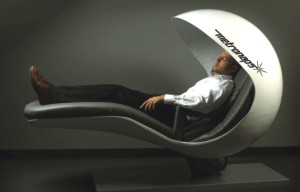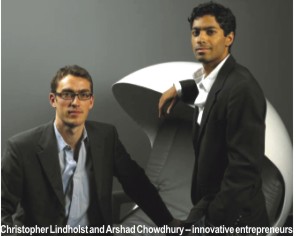|
Technology
Sleep
for Sale
Daud
Khan
 Arshad
Chowdhury's new office, on the 24th floor of the iconic Empire
State Building in New York City, looks like the set of a science
fiction movie. Eight fiberglass and steel pods line the walls,
their billowy shapes illuminated softly from lights above.
What happens in them is not science, but something much more
elemental: Sleep. They are the centrepiece of what Chowdhury,
a Bangladeshi-American, claims is the first of its kind in
the world: a state of the art sleeping salon called MetroNaps,
where over-worked, bleary-eyed professionals pay to take a
mid-day rest. Arshad
Chowdhury's new office, on the 24th floor of the iconic Empire
State Building in New York City, looks like the set of a science
fiction movie. Eight fiberglass and steel pods line the walls,
their billowy shapes illuminated softly from lights above.
What happens in them is not science, but something much more
elemental: Sleep. They are the centrepiece of what Chowdhury,
a Bangladeshi-American, claims is the first of its kind in
the world: a state of the art sleeping salon called MetroNaps,
where over-worked, bleary-eyed professionals pay to take a
mid-day rest.
Paying
to powernap may seem like a strange idea, but MetroNaps has
struck a deep chord in the global working world so far, offering
professionals an easy solution for making mid-day rest part
of their daily routine. With franchises opening in North America
and a storm of media buzz, the innovation could change the
future of working life.
MetroNaps,
which opened for business in May 2004, was conceived as a
redress to the negative side effects of global working culture,
where employees are spending more and more of their time in
their offices, staring at computer screens, with little or
no rest throughout the day. Chowdhury, 29, who hails from
the state of Connecticut, says there's a real problem in the
lifestyle that corporate culture breeds. "In the last
15 years, people are working more and sleeping less. Now people
are sleeping 6 to 7 hours a night, not the 8 to 10 recommended
by doctors."
Chowdhury
should know. He used to work for a multinational banking concern
in New York, clocking long hours himself while watching his
colleagues desperately seeking sleep. "I saw a lot of
them sleeping at their desks. People would even sneak off
to the bathroom to take a nap."
All the
sagging eyelids convinced Chowdhury of two things: one, today's
professionals are woefully sleep deprived; two, they lack
viable options for taking a mid-day rest. "For someone
who wants to sleep, they basically have only two options:
a very uncomfortable chair or a very expensive hotel--there's
nothing in between," explains Chowdhury.
Filling
that void could add up to a business, he thought. But would
people actually pay to take a nap?
He decided
to test the concept while pursuing his MBA at Carnegie Mellon
in Pittsburgh, Pennsylvania, setting up a small makeshift
nap centre on the university's campus. His hunch was right,
and he soon found himself with ample customers willing to
pay $1.00 to take a nap in a simple lawnchair.
With renewed
conviction and an MBA fresh under his belt, Chowdhury teamed
up with a college friend, Christopher Lindholst, a fellow
MBA graduate and the two soon secured initial funding to launch
the business.
Then,
using the latest sleep deprivation research, they spent two
years creating the ideal sleeping environment for prospective
customers, employing along the way the creative talents of
Matthew Huey, who has designed furniture for such world class
companies as Knoll and Lucite.
The
result is the centrepiece of the MetroNaps experience: the
MetroNaps pod, a sleek, futuristic-looking hull in which customers
recline, make their choice of ambient music, and then slip
promptly into sleep. (Chowdhury, a veritable encyclopedia
of sleep statistics, says the average person falls asleep
in 5 ½ minutes). Special lights and soft vibrations
wake dozers at the end of the rest period, which lasts a blissful
twenty minutes - the optimal amount of time to boost alertness
and brain activity, Chowdhury says.
"You
don't sleep as much or as deeply, but you avoid sleep inertia,
the feeling of grogginess that comes from sleeping too deeply,"
he adds.
Eight
sleeping pods now line the walls of the MetroNaps' flagship
office in the Empire State building. Their quirky novelty
and sci-fi good looks have already generated a storm of media
buzz less than a year after going into operation, appearing
in numerous major news outlets, including The New York Times,
Fortune Magazine and BBC News.
Chowdhury
says he's very pleased with the customer response so far,
reporting that the pods are often full by the afternoon. Most
customers are full-time members of the facility, paying $65
a month for daily access to the pods. The centre also attracts
a good number of curious walk-in clients who pay $14 for the
20-minute session. Metronaps, open daily from 10:00am to 6:00pm,
even offers a lunch service for an extra fee, serving customers
their choice of sandwiches, pastas and salads when they wake.
Chowdhury
is still cautiously optimistic about the future of his business,
but signs abound that the company is doing well. In January,
MetroNaps opened a new centre in the Vancouver International
Airport in Canada, allowing weary airport goers the option
of dozing off comfortably right near their gates. The cost
is $15.00 for 2 hours of rest.
"Airports
seemed like a natural fit because people in airports are generally
exhausted," Chowdhury explains, adding, "They have
long lags, so they're enthusiastic about our store."
Chowdhury
hopes the company's New York and Vancouver locations are just
the first of many such franchises. Eventually he'd like to
see MetroNaps pods become part of the standard architectural
furniture of offices and airports everywhere. "I want
this to be as ubiquitous as the photocopying machine,"
he says.
The plan,
in other words, is not just to grow the business, but to effect
a larger change in the way professionals live and work. "We
intend nothing less than a shift in the global working world,"
Chowdhury proclaims.
To that
effect, MetroNaps is currently working on an international
rollout, with pods to be deployed possibly in the UK, Japan,
Australia and Brazil.
Chowdhury
was born and raised in the US, but Bangladesh has been a central
source of emotional and financial support in the launching
of his business.
To begin
with, growing up in a Bangali community in Connecticut helped
mold Chowdhury's entrepreneurial drive, giving him the courage
to take risks. "Almost everyone in my family is involved
in businesses of one form or another, from groceries to Kentucky
Fried Chicken franchises. I certainly saw how my family and
other Bangladeshis paved their own road to success."
Building
a business around a mid-day rest resonated strongly with Chowdhury's
Bangladeshi circle, beginning with his father. "My father,
Dr. Mujibul G. Chow-dhury, is a cardiologist and physician,
and he sees the benefits of a mid-day rest."
Three
Bangladeshis from Connecticut have even invested significantly
in the project. "Several Bangladeshis, who are doctors
and lawyers, have supported the idea, because they see how
unhealthy the American working lifestyle is," explains
Chowdhury.
 Chowdhury
says he has no immediate plans to open a MetroNaps centre
in Bangladesh, but plans to explore the possibility of outsourcing
portions of his manufacturing process here. He even hopes
to tour several factories during a family visit to Bangladesh
in March. "It's just an exploratory trip at this point,"
he explains. Chowdhury
says he has no immediate plans to open a MetroNaps centre
in Bangladesh, but plans to explore the possibility of outsourcing
portions of his manufacturing process here. He even hopes
to tour several factories during a family visit to Bangladesh
in March. "It's just an exploratory trip at this point,"
he explains.
When not
working, Chowdhury plans to spend time with his family in
Chittagong, including his uncle, Yakub Ali, or to visit some
of his favourite spots in Dhaka: Bongo Bazar and Boss Tailors.
The growth
of Metronaps will no doubt keep him busy for the foreseeable
future, but Chowdhury hopes to keep coming back to Bangladesh,
which he has visited every year since his childhood. "I'm
always impressed to see how much development is taking place
in Dhaka," Chowdhury says, adding, "I'd like to
see it become more of an international destination city for
tourists."
If that
happens, MetroNap pods could someday pop up at Zia International,
offering passengers a quick powernap before they jet off around
the world.
Copyright
(R) thedailystar.net 2005 | 